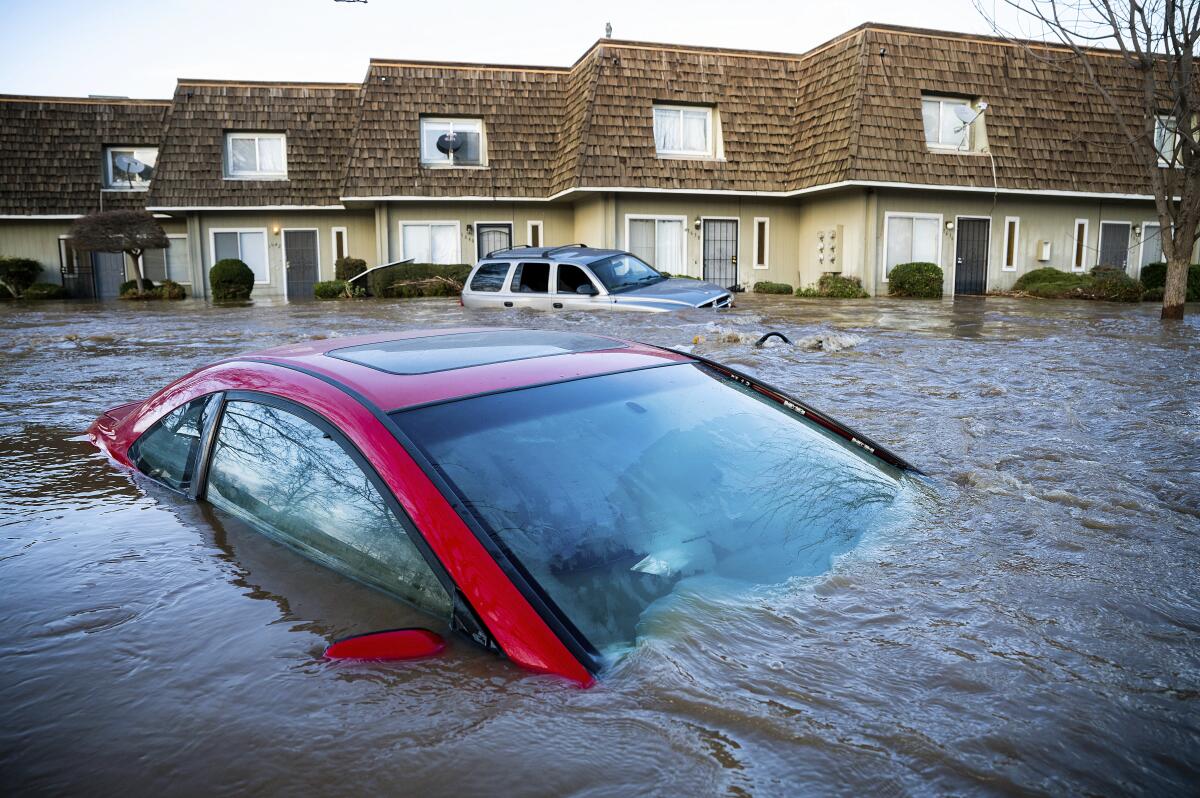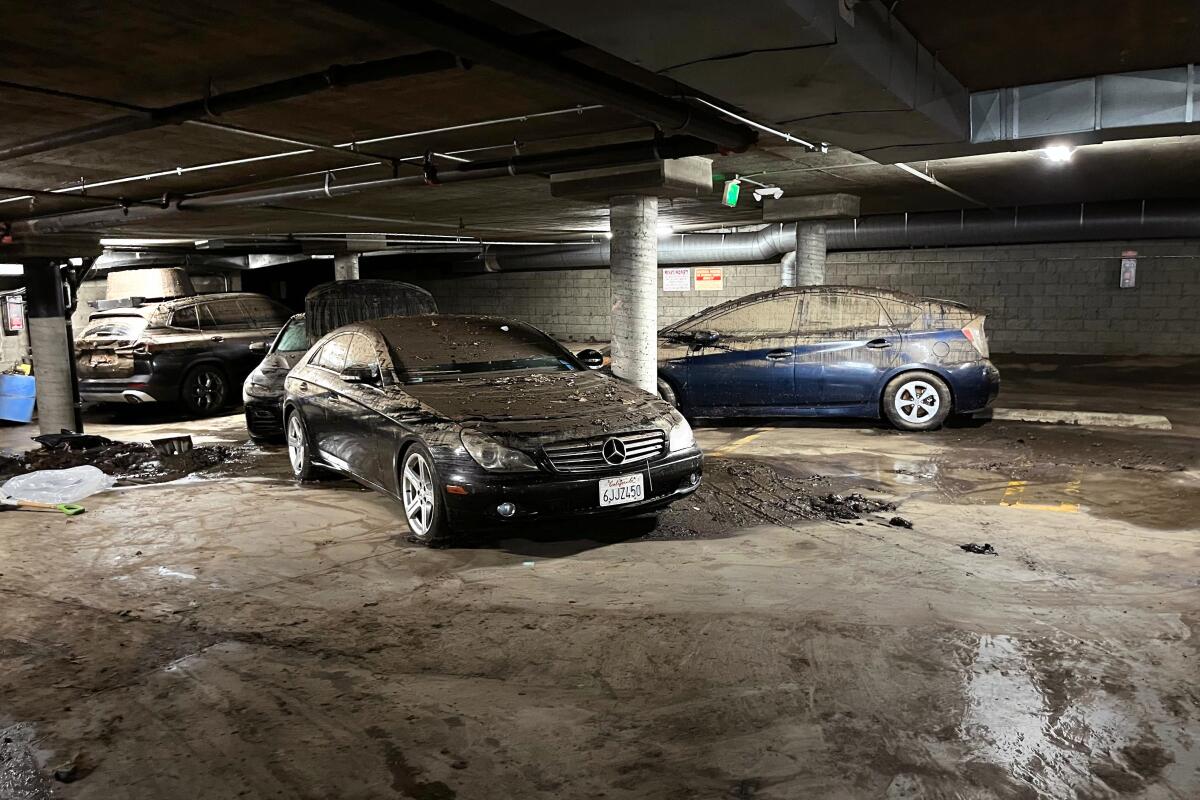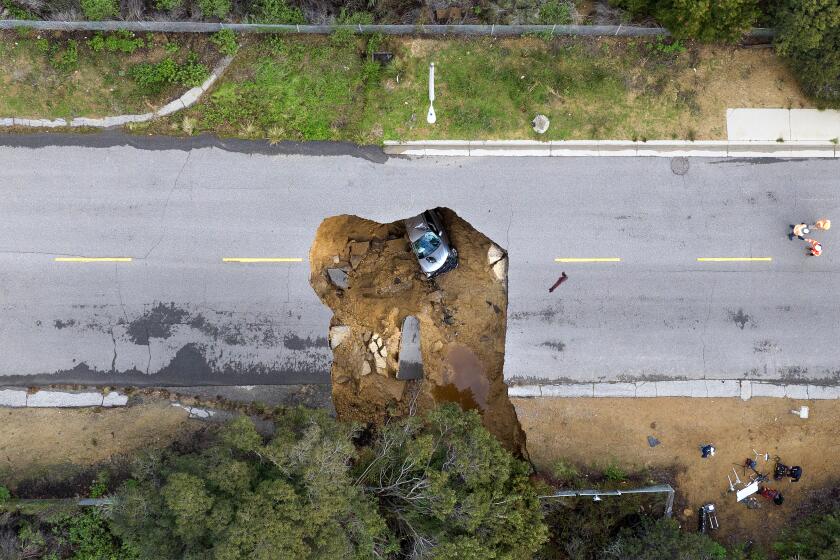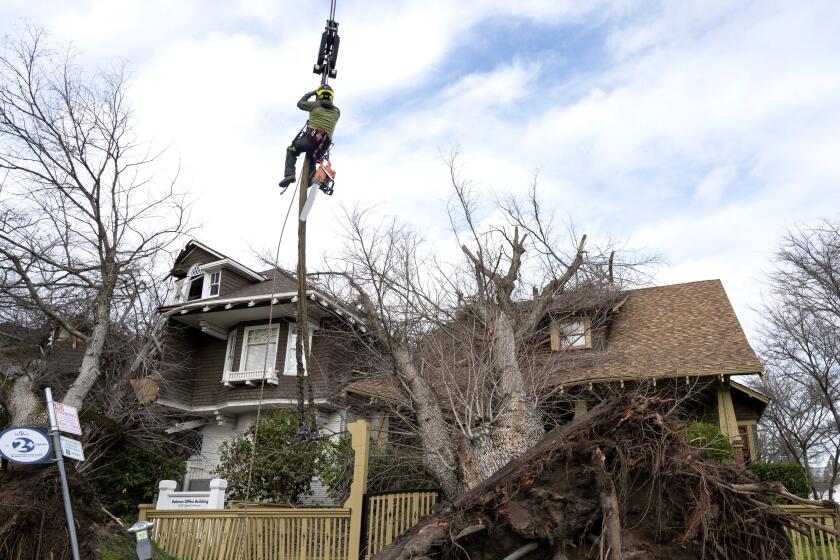Wondering what happens to all those cars destroyed by California’s floods? Here’s where they’re headed

It’s the smell that’ll give it away.
‚ÄúYou had better get your face close to carpet,‚ÄĚ urged Ivan Drury of Edmunds, the automotive information service.
Now take a whiff.
‚ÄúThat gross, musty smell,‚ÄĚ said Drury, ‚Äúthat‚Äôs a big red flag.‚ÄĚ
It means the vehicle probably has been in a flood. Soon, these may be the perils of shopping for a used car in California.
That‚Äôs because hundreds, if not thousands, of vehicles were inundated during the series of rainstorms that ripped through much of the state in January. They generated the sort of flooding that can wreak havoc on automobiles ‚ÄĒ think: rusty floorboards, water-logged electronics and inoperable engines.
Storm damage repairs in Los Angeles County could cost $100 million and continue to grow, according to county officials.
In the days and weeks ahead, a complex ecosystem of insurance companies, auction houses, car dealers and others will process these soggy automotive casualties. Many will eventually wind up for sale again. And at least some of those rides will be risky buys.
Kenneth Potiker, owner of Riteway Auto Dismantlers, knows what advice he’d give to people considering the purchase of such a vehicle.
‚ÄúI would tell them not to buy a car like that ‚ÄĒ that would be the best advice,‚ÄĚ said Potiker, whose San Bernardino company sells used auto parts. ‚ÄúIf it floods inside a car, water damage is one of the worst types of damage.‚ÄĚ
Many flooded vehicles will be totaled by insurance companies ‚ÄĒ this is generally done when the cost of the necessary repair work is equal to or more than the value of the vehicle. These cars will be retitled via the California Department of Motor Vehicles with ‚Äúsalvage,‚ÄĚ or ‚Äújunk‚ÄĚ designations, which alert consumers to their past damage or other issues. Then, a large number will be unloaded at auctions conducted by companies such as Copart and Insurance Auto Auctions, based in Dallas and Westchester, Ill., respectively.
A host of bidders will compete for the drowned derelicts ‚ÄĒ some of whom may have less than honest intentions for the reselling of the rides. And that matters, because cars that have suffered water damage could be perilously unsafe, both physically and technologically, even if they don‚Äôt look that way, said Drury, director of insights for Edmunds.
‚ÄúNumber one, your electrical system: you‚Äôve got so much electronics on a car, now more so than ever. Technology systems prevent you from getting into an accident, and now you are in more danger,‚ÄĚ he said. ‚ÄúAnd there‚Äôs the vehicle physically deteriorating over time.‚ÄĚ
The storms hitting California threaten to blow a tree limb into your home or car. Who pays for the damage will depend on where the tree was located, what condition it was in and what kind of insurance you have.
Following Hurricane Ian’s devastating assault on Florida and neighboring states in September, Carfax, the vehicle data firm, warned consumers of the risks of buying used cars with water damage. The company also estimated that flooding brought on by the hurricane may have damaged as many as 358,000 vehicles.
‚ÄúWe are seeing these flooded cars show up all around the country, putting unsuspecting buyers at risk,‚ÄĚ Emilie Voss, a spokeswoman for Carfax, said in a statement in October. ‚ÄúCosmetically these cars might look great, but if you don‚Äôt know what to look for, it‚Äôs nearly impossible to tell they are literally rotting from the inside out.‚ÄĚ
Before the hurricane, Carfax estimated that in 2022 there were about 400,000 vehicles on the road with flood damage in their history, Voss said in a statement to The Times.
An eclectic group of buyers are likely to compete for vehicles damaged in California’s January storms. Many cars will be acquired at auction by entrepreneurs and shipped overseas, where they could be resold. Some will be purchased by dealers who will recondition them and sell them as used cars. There are those that will be purchased by private-party buyers, who are able to bid at certain auctions. And others will be bought by dismantling operations that will strip the vehicles for parts and resell their usable remnants.
Potiker is one such businessman, and he expects to see the flooded cars popping up at auctions in about a month. But he does not plan to be a major bidder.
‚ÄúI‚Äôll buy a few, I‚Äôm sure ‚ÄĒ but I stay away from a lot,‚ÄĚ he said, explaining that it can be difficult to tell the extent of damage before bidding. There‚Äôs also competition from bidders with overseas interests who will often pay more than he‚Äôs willing to bid.
Racer Yoemans has a similar perspective. He’s president of salvage-parts data software company BidCall, which is headquartered in Seguin, Texas, and he also deals used parts.
‚ÄúTo be perfectly honest with you,‚ÄĚ he said, ‚ÄúI don‚Äôt buy flood vehicles.‚ÄĚ
A twist for the used car market
The introduction of thousands of additional vehicles into California’s used car marketplace would be yet another twist during a strange stretch for the industry.
Used car prices soared during the first two-plus years of the COVID-19 pandemic, as a once-in-a-generation set of circumstances turbocharged the business. The 2020 collapse of the rental car market during the early part of the pandemic, major production issues in the new automobile arena and droves of buyers flush with stimulus checks turned the used car economy upside down, leading to inventory shortages that sent prices soaring.
Although the business has stabilized in recent months ‚ÄĒ prices started to drop around last fall ‚ÄĒ a deluge of formerly flooded autos could be a welcome occurrence for dealers who endured scant inventory in recent years.

It is legal to sell a vehicle with a ‚Äúsalvage‚ÄĚ or ‚Äújunk‚ÄĚ title ‚ÄĒ as long as the damage is disclosed. And the major auction companies provide prospective bidders with detailed information about their offerings.
Take Insurance Auto Auctions, which operates a global online marketplace for the sale of total-loss, damaged and low-value vehicles. The company, which auctions cars on behalf of its clients ‚ÄĒ among them insurance and rental car companies ‚ÄĒ discloses particulars that would be crucial to a potential buyer. Its online listings lay out details such as a car‚Äôs title status, mileage, driveability and the type of damage it has incurred. They also include several photographs and a 360-degree image.
Nonetheless, merchants who specialize in the purchase and resale of flooded cars often take big risks that come with potentially big profit margins. Meanwhile, consumers might be enticed by these cars, which usually come with surprisingly low prices. Flood-damaged cars can typically be purchased at a 40% to 70% discount on Kelley Blue Book valuations, Drury said.
The slew of rides set to hit the auction blocks could present shady operators with a major opportunity, experts said. According to Potiker, the reason is simple: ‚ÄúPeople can fix them and no one would know. That‚Äôs the way it works.‚ÄĚ
Drury said that water damage is a vexing issue because it can be hard to discern. A totaled car from this month‚Äôs flood might have endured a day or two fully submerged in water, so that every component was saturated ‚ÄĒ or it could have only had its interior ruined due to a faulty sunroof seal.
‚ÄúIt varies wildly between what is truly destroyed and something that is salvageable,‚ÄĚ he said. ‚ÄúThat‚Äôs where you really have to have someone you trust if you‚Äôre looking to purchase one.‚ÄĚ
Buyer beware
To avoid purchasing a badly flood-damaged car, there are several things that consumers can do to inoculate themselves from a disastrous acquisition from a dealer or private party.
First, experts said, would-be buyers should consult a service such as Carfax to check an auto’s history; such products will show the status of a car’s title and could include other pertinent information.
‚ÄúBad guys [are] counting on people not doing that,‚ÄĚ Drury said. ‚ÄúSometimes buyers keep their blinders on and just say, ‚ÄėI want it.‚Äô‚ÄĚ
When considering the purchase of a vehicle from a private party, experts recommend paying to have it professionally inspected. Drury called such an inspection, which would detect water damage, ‚Äúa must.‚ÄĚ Forgoing one means a buyer should be prepared to get their hands dirty trying to replicate the process.
‚ÄúIf you are going to do it yourself, you ... [should] see if there is rust, funny smells or dirt in places it shouldn‚Äôt be,‚ÄĚ Drury said. ‚ÄúAre there water lines in the carpet? That goes for seat cushions, too. If anything electrical seems off ‚ÄĒ and everything else looks OK ‚ÄĒ you could have issues there.‚ÄĚ
In the end, with used car dealers, Drury said, there’s a hope that they will operate ethically.
‚ÄúThere are sellers who specialize in salvage-title vehicles, and hopefully they have a list of things they‚Äôve done to bring it up to driving status,‚ÄĚ he said.
Still, Drury said consumers need to take caution when considering the purchase of any used car that has been registered in a city or state where there has been flooding. This, he said, makes those vehicles ‚Äúsuspect.‚ÄĚ
That, of course, now includes Los Angeles ‚ÄĒ and California.
Staff writer Russ Mitchell contributed to this report.
More to Read
Inside the business of entertainment
The Wide Shot brings you news, analysis and insights on everything from streaming wars to production ‚ÄĒ and what it all means for the future.
You may occasionally receive promotional content from the Los Angeles Times.











